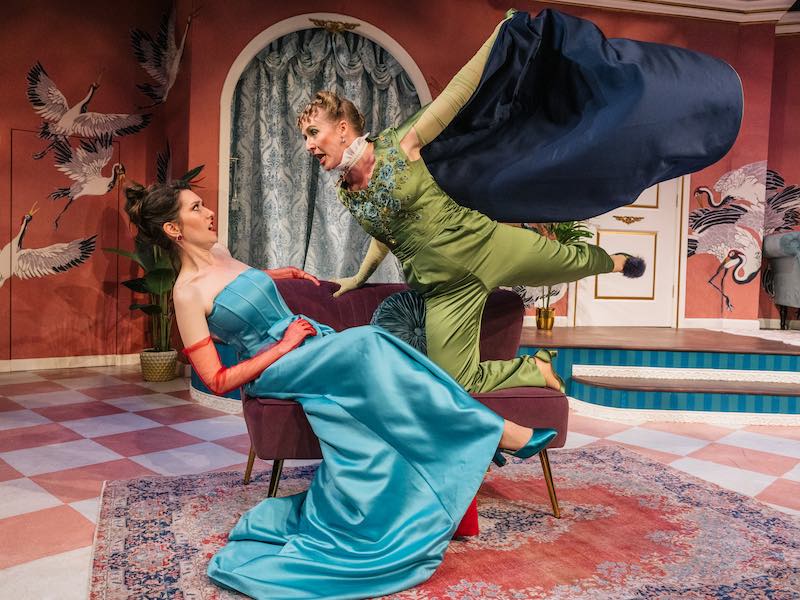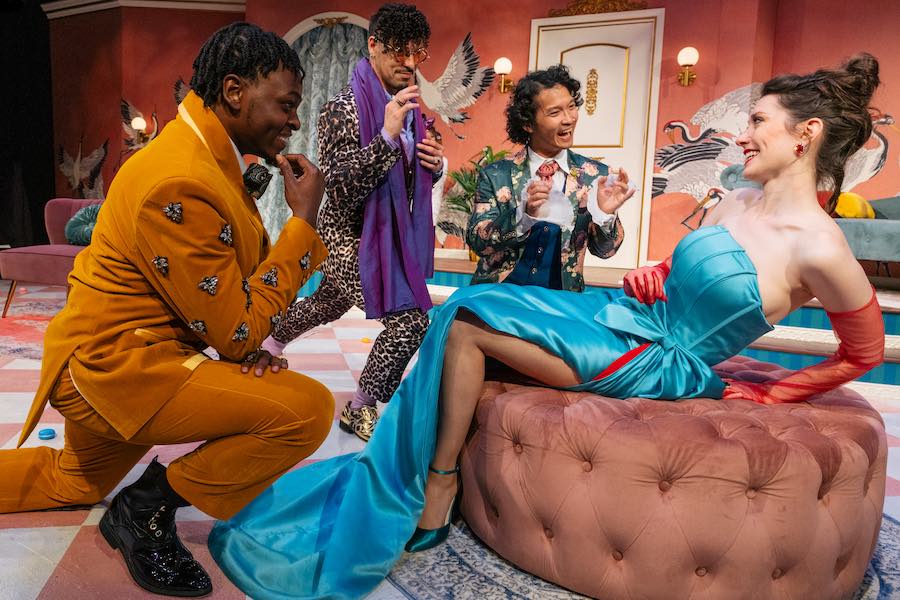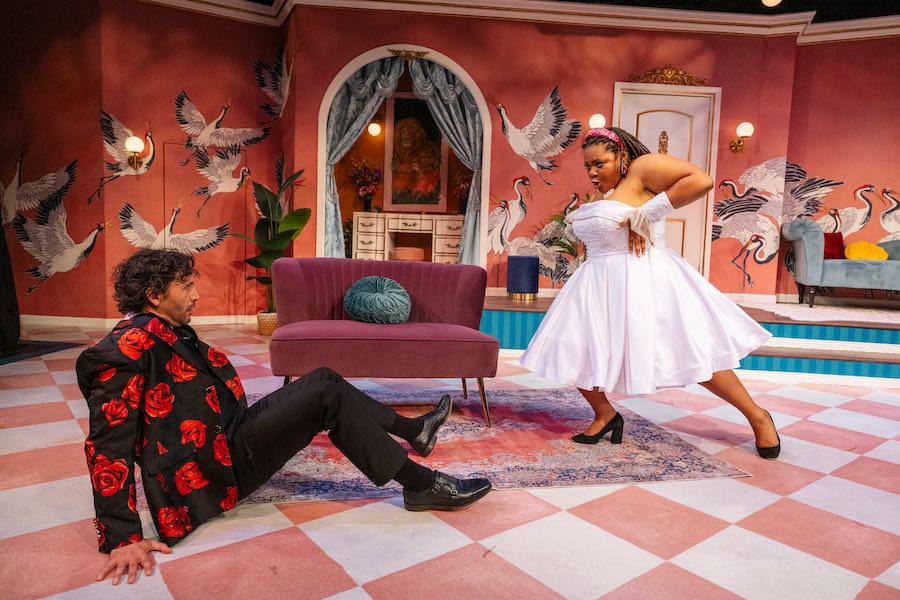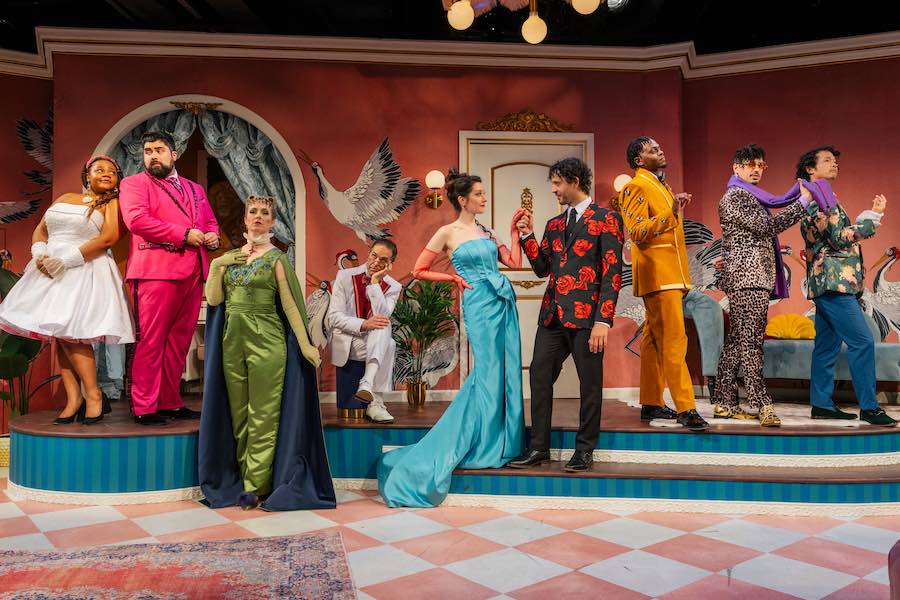Molière knew all about misinformation all the way back in 1666, and David Ives’ The School for Lies plunges us right into the middle of it. Much like the masterpiece that inspired it, Molière’s The Misanthrope, Ives’ play is dedicated to the proposition that even those who go through life proclaiming that they only speak the truth are just as deluded as everyone else.
Molière (1622–1673), whose work was celebrated at the glittering court of the Sun King Louis XIV, was a playwright, actor, and poet all in one. He was often harassed by the authorities, and his plays were sometimes deemed obscene and/or anti-religious. But Molière, a comic genius, was so dedicated to his craft that he was literally carried off the stage to his deathbed.

Constellation Theatre Company’s gorgeous production will leave you feeling like you’ve just had several glasses of champagne, are ordained by Fate to solve all the world’s problems, and will under no circumstances have a hangover. In fact, you will never have one again.
Philinte (Dylan Arredondo), in a stunning pink ensemble, initially offers us a cynical and very funny monologue on the benighted state of life in 17th-century France. He is joined by his friend Clitander (Jamil Joseph), who is influential at court, and the misanthropic Frank (Drew Kopas), all in black, who has just returned from the far more mundane shores of Britain. Frank’s sojourn in the UK has made him more sardonic than ever. He and Clitander fail to hit it off.
CLITANDER: I note your widow’s weeds. Was it a wife?
FRANK: No, I wear black in mourning for your life.
CLITANDER: A pithy joke. You live up to the rumor.
FRANK: I never joke. I have no sense of humor.
All three are denizens of the dazzling salon of the widow Célimène (Natalie Cutcher), a well-known flirt, who has a talent for bewitching the men around her, and a wit so acerbic that she is currently being sued.
Arredondo’s Philinte, in the course of the play, will be adored, flattered, transformed into royalty, and repeatedly denied the affection of his beloved Eliante (Ría Simpkins). He endures it all with a smile, a gift for physical comedy, and infectious good nature. Jamil Joseph as Clitander, a suitor of Célimène, is confident and hilarious, quick with a laugh at the right time, and frequently bemused by the lunacy that surrounds him.

Frank is the kind of uncompromising zealot all the girls find irresistible (at least in this play) until they stop to think about it. Kopas as Frank captures his fractious air of righteous indignation, combining it with a refreshing athleticism and the skill, very crucial for Molière and David Ives, to declare one opinion passionately and the exact opposite three minutes later.
Another of Célimène’s swains, the hapless Oronte (Jacob Yeh) flits around the stage like a demented beetle, going into raptures over his own poetry and pondering his own greatness. “Ah, Phyllis, Phyllis, Phyllis, You’re like some strange bacillus,” he intones ardently, incurring Frank’s profound and vocal intellectual disdain until, you guessed it, Frank too is getting sued.
The highly versatile Ryan Sellers as Acaste makes every line count. Célimène, he hopes, will be charmed by two of his qualities: wealth and imbecility. Is he out of touch? Perhaps. Perhaps not.
Natalie Crutcher’s Célimène, chastened for being too clever for her own good, reminds us that there is no such thing. She turns her famed critiques into rap melodies, accompanied by the uproarious dance moves of her visitors. As her attraction to Frank becomes more evident, we sense deeper emotion behind the sparkling façade. Simpkins as her bestie Eliante, demure in a white dress, turns into a delightfully voracious sexual ninja in the blink of an eye, which leaves Frank, as well as the audience, gasping with awe.

Arsinoë (Gwen Grastorf), a mean girl par excellence, Célimène’s “best friend” (worst enemy) and would-be nemesis, attempts a number of nasty tricks that gain her, predictably, nothing. Mortally affronted by Célimène’s skill in flirtation, memorably attired in a puce pantsuit and cape, she is an avatar of, well, something, and she carries it off with immaculate condescension. She and Célimène stand at attention and glare at each other like two would-be duelists in Hamilton. Or perhaps they are Bette Davis and Joan Crawford, replete with enough artistic jealousy to kill, or perhaps just push the other one off the stage.
Matthew Pauli as the servant Dubois enters at key moments with canapes, which are perpetually being knocked out of his hands by Frank, among others. But he gets his revenge in the end. There is lots of revenge about: revenge lawsuits, revenge marriages, even revenge canape-tossing.
Molière, with his love for commedia dell’arte, would be exhilarated by all the physical hijinks on stage, which are perpetual and uniformly hilarious. Director Allison Arkell Stockman, along with her actors, reminds us at every moment just how fresh and insightful Ives’ comedy can be.

The costumes by Frank Labovitz have such breathtaking originality and flair that it would be a pleasure just to spend an hour or two figuring out how they achieved their effects. Scenic Designer Sarah Reed’s opulent set has a beauty and level of detail that tempts you to stare at it forever, or perhaps move in.
Sound Designer Cresent R. Haynes utilizes brass, strings, and other instruments to create a mélange of aural delight. Jordan Stanford’s intimacy and fight direction is rich in anarchic humor. Andrew Michael Reilly’s props design adds to the nonstop laughter with feathers, fans, and various other curiosities too indescribable to name. And the wigs…oh, the wigs!
The length of the play is one hour and 25 minutes. It will pass like a dream.
Running Time: One hour and 40 minutes, with no intermission.
The School for Lies plays through May 28, 2023, presented by Constellation Theatre Company performing at Source Theatre, 1835 14th Street NW, Washington DC (between 14th and T). Purchase tickets ($20–$55) online.
First responders, active or retired military personnel, teachers, and students are eligible for
a 50% discount on regularly priced tickets. Visit ConstellationTheatre.org/special-offers for discount codes and more information.
COVID Safety: Masks are mandatory for all patrons inside the theater. N95 and KN95 masks are preferred. Masks will be available at the theater. Constellation Theatre Company’s COVID-19 Safety Plan is here.
The School for Lies
By David Ives
Inspired by Molière’s The Misanthrope
CAST
Philinte: Dylan Arredondo
Célimène: Natalie Cutcher
Arsinoë: Gwen Grastorf
Clitander: Jamil Joseph
Frank: Drew Kopas
Dubois/Basque: Matthew Pauli
Acaste: Ryan Sellers
Eliante: Ría Simpkins
Oronte: Jacob Yeh
CREATIVE TEAM
Director: Allison Arkell Stockman
Scenic Designer: Sarah Reed
Costume Designer: Frank Labovitz
Lighting Designer: Brittany Shemuga
Sound Designer: Cresent R. Haynes
Props Designer: Andrew Michael Reilly
Intimacy & Fight Director: Jordan Stanford




